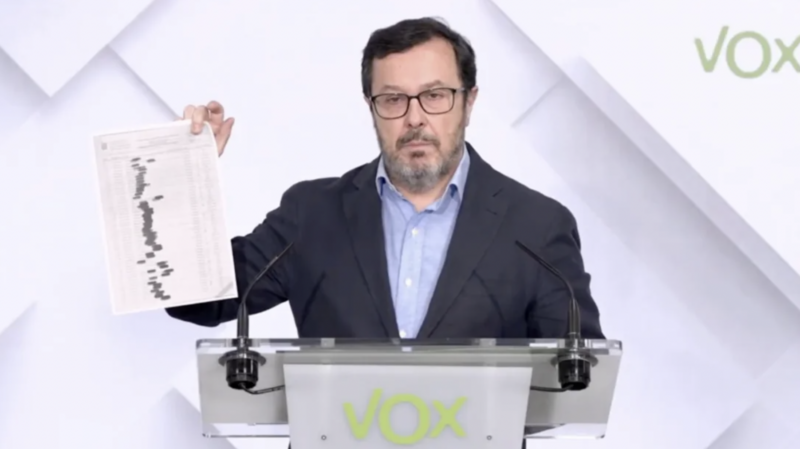Spain’s political establishment is once again cracking down on those daring to question the prevailing narrative. José Antonio Fúster, the national spokesman for the populist Vox party and a Madrid Assembly member, now faces a hate crime investigation after publicly linking mass immigration to rising crime rates—an assertion backed by official government data but aggressively downplayed by Spain’s leftist government.
During a press conference on July 29 last year, Fúster read out a series of first names belonging to individuals arrested in violent incidents that weekend in Barcelona. “Sabar, Omar, Nassim, Abdelkader, Salah, Salah, Younes, Karim, Jamil, Amir, Ali, Oussama, Hassan… I could go on. Notice any patterns?” he asked.
Fúster argued that Spain’s open-border policies, endorsed by both the Popular Party and the ruling PSOE, had led directly to increased crime and public insecurity. Though the list he cited had already been circulated within party channels—with surnames omitted—his public recitation of the names prompted Spain’s National Police to file a report accusing him of incitement to hatred.
Unbowed, Fúster slammed the charges as an attempt to silence legitimate concerns. “We’re told immigration and crime aren’t connected, but no one believes that anymore,” he stated. “The criminals terrorizing Spanish neighborhoods have names, and we all know them.”
Vox has long maintained that Spain’s hate speech laws are weaponized to stifle dissent. The party pointed to previous cases, including charges against MP Rocío de Meer for commenting on demographic change and the pending trial of Jordi de la Fuente over a 2019 protest against an asylum center.
Vox leader Santiago Abascal has called for urgent reforms to Spain’s Penal Code, particularly Article 510, which defines hate crimes. “What they call ‘hate speech’ is often just speech they hate,” Abascal remarked. “We’re merely stating facts, using the government’s own numbers.”
Those statistics paint a stark picture. A report by La Gaceta found that between 2013 and 2023, homicides involving foreign suspects surged by 69 percent—far outpacing the overall increase of 28 percent. Spain’s Interior Ministry confirmed that violent robberies and intimidation are most rampant in Catalonia, where foreigners are significantly overrepresented in crime data.
Prison statistics tell a similar story. Of the 8,505 inmates in Catalan prisons, more than half—50.48 percent—are foreign nationals. When it comes to the most heinous crimes, the disparity grows even starker: 91 percent of those convicted of rape in Catalonia are foreigners. For sexual assault and rape combined, foreigners account for 64.2 percent of prisoners.
Following news of the investigation, Fúster received overwhelming support from his party. Vox Secretary General Ignacio Garriga reaffirmed the party’s stance: “The names Fúster read were those of the first 50 individuals arrested in a single night in Barcelona. Let them investigate all of us—we’ll keep speaking the truth.”
Party leader Abascal also chimed in, pointing out that those truly responsible for Spain’s crime wave have different names altogether: “Let’s not forget the surnames of the politicians who condemned us to this—Sánchez, Bolaños, Marlaska, Montero, Díaz… and their bipartisan enablers.”
Despite the mounting legal pressure, Vox remains resolute. As establishment forces try to muzzle dissent, the party has vowed to keep exposing uncomfortable truths—no matter how hard the ruling class tries to suppress them.




